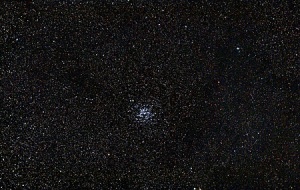Messier 11: Difference between revisions
No edit summary |
No edit summary |
||
| Line 2: | Line 2: | ||
[[Messier 11]] is The Wild Duck Cluster (also known as Messier 11, or NGC 6705) is an open cluster in the constellation Scutum. It was discovered by Gottfried Kirch in 1681. Charles Messier included it in his catalogue in 1764. The Wild Duck Cluster is one of the richest and most compact of the known open clusters, containing about 2900 stars. Its age has been estimated to about 220 million years. Its name derives from the brighter stars forming a triangle which could resemble a flying flock of ducks. <ref>[http://en.wikipedia.org/wiki/Wild_Duck_Cluster Messier 11]</ref> | [[Messier 11]] is The Wild Duck Cluster (also known as Messier 11, or NGC 6705) is an open cluster in the constellation Scutum. It was discovered by Gottfried Kirch in 1681. Charles Messier included it in his catalogue in 1764. The Wild Duck Cluster is one of the richest and most compact of the known open clusters, containing about 2900 stars. Its age has been estimated to about 220 million years. Its name derives from the brighter stars forming a triangle which could resemble a flying flock of ducks. <ref>[http://en.wikipedia.org/wiki/Wild_Duck_Cluster Messier 11]</ref> | ||
==Etymology== | |||
Scutum is the Latin word for shield, although it has in modern times come to be specifically associated with the rectangular, semi-cylindrical body shield carried by Roman legionaries. <ref>[http://en.wikipedia.org/wiki/Scutum_%28shield%29 Sctu]</ref> | |||
==Session References== | ==Session References== | ||
Revision as of 01:38, 2 March 2015
Messier 11 is The Wild Duck Cluster (also known as Messier 11, or NGC 6705) is an open cluster in the constellation Scutum. It was discovered by Gottfried Kirch in 1681. Charles Messier included it in his catalogue in 1764. The Wild Duck Cluster is one of the richest and most compact of the known open clusters, containing about 2900 stars. Its age has been estimated to about 220 million years. Its name derives from the brighter stars forming a triangle which could resemble a flying flock of ducks. [1]
Etymology
Scutum is the Latin word for shield, although it has in modern times come to be specifically associated with the rectangular, semi-cylindrical body shield carried by Roman legionaries. [2]
Session References
HGS Sessions - Parallel Earth 2/12/2015
References
Found in HGS Manual on Page 108


